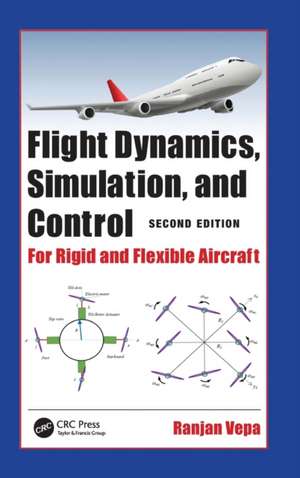Flight Dynamics, Simulation, and Control: For Rigid and Flexible Aircraft
Autor Ranjan Vepaen Limba Engleză Hardback – 11 apr 2023
Preț: 885.92 lei
Preț vechi: 1107.39 lei
-20% Nou
169.52€ • 177.49$ • 140.61£
Carte disponibilă
Livrare economică 20 martie-03 aprilie
Livrare express 05-11 martie pentru 49.43 lei
Specificații
ISBN-10: 1032210036
Pagini: 642
Ilustrații: 50 Tables, black and white; 128 Line drawings, black and white; 3 Halftones, black and white; 131 Illustrations, black and white
Dimensiuni: 156 x 234 x 40 mm
Greutate: 1.07 kg
Ediția:2 ed
Editura: CRC Press
Colecția CRC Press
Public țintă
Postgraduate and Undergraduate AdvancedCuprins
1. Introduction to Flight Vehicles. 2. Basic Principles Governing Aerodynamic Flows. 3. Mechanics of Equilibrium Flight. 4. Aircraft Nonlinear Dynamics: Equations of Motion. 5. Small Perturbations and the Linearized, Decoupled Equations of Motion. 6. Longitudinal and Lateral Linear Stability and Control. 7. Aircraft Dynamic Response: Numerical Simulation and Nonlinear Phenomenon. 8. Aircraft Flight Control. 9. Piloted Simulation and Pilot Modelling. 10. Flight Dynamics of Elastic Aircraft. 11. Dynamics and Control of Drones and Unmanned Aerial Vehicles.
Notă biografică
Dr. Ranjan Vepa earned his PhD in applied mechanics from Stanford University, Stanford, California, specialising in the area of aeroelasticity under the guidance of the late Professor Holt Ashley. He currently serves as a Reader in Aerospace Engineering in the School of Engineering and Material Science, Queen Mary University of London, where he has also been the programme director of the Avionics Programme since 2001. He is the author of seven books titled: Electric Aircraft Dynamics: A Systems Engineering Approach (CRC Press, 2020), Dynamics and Control of Autonomous Space Vehicles and Robotics (Cambridge University Press, 2019), Nonlinear Control of Robots and Unmanned Aerial Vehicles: An Integrated Approach (CRC Press, 2016), Flight Dynamics Simulation and Control of Aircraft: Rigid and Flexible (CRC Press, 2014), Dynamic Modelling, Simulation and Control of Energy Generation (Springer, 2013), Dynamics of Smart Structures (Wiley, 2010) and Biomimetic Robotics: Mechanisms and Control (Cambridge University Press, 2009).
His research interests include the design of control systems, and associated signal processing with applications in aerospace systems, smart structures, robotics, biomedical engineering, and energy systems. In particular, the research interests include dynamics and robust adaptive estimation and control of linear and nonlinear aerospace, energy systems, including renewable and sustainable energy and desalination systems with parametric and dynamic uncertainties. Dr. Vepa is a member of the Royal Aeronautical Society, London; the Institution of Electrical and Electronic Engineers (IEEE), New York; a fellow of the Higher Education Academy; a member of the Royal Institute of Navigation, London; and a chartered engineer.
Descriere
Flight Dynamics, Simulation, and Control of Aircraft: For Rigid and Flexible Aircraft explains the basics of non-linear aircraft dynamics and the principles of control-configured aircraft design, as applied to rigid and flexible aircraft, drones, and unmanned aerial vehicles (UAVs).
Addressing the details of dynamic modeling, simulation, and control in a selection of aircraft, the book explores key concepts associated with control-configured elastic aircraft. It also covers the conventional dynamics of rigid aircraft and examines the use of linear and non-linear model-based techniques and their applications to flight control. This second edition features a new chapter on the dynamics and control principles of drones and UAVs, aiding in the design of newer aircraft with a combination of propulsive and aerodynamic control surfaces. In addition, the book includes new sections, approximately 20 problems per chapter, examples, simulator exercises, and case studies to enhance and reinforce student understanding.
The book is intended for senior undergraduate and graduate mechanical and aerospace engineering students taking Flight Dynamics and Flight Control courses.
Instructors will be able to utilize an updated Solutions Manual and figure slides for their course.
